“No precedent for this mass destruction”: Yale students recount the LA wildfires
The News spoke with students from Los Angeles about their experiences of the devastating wildfires.
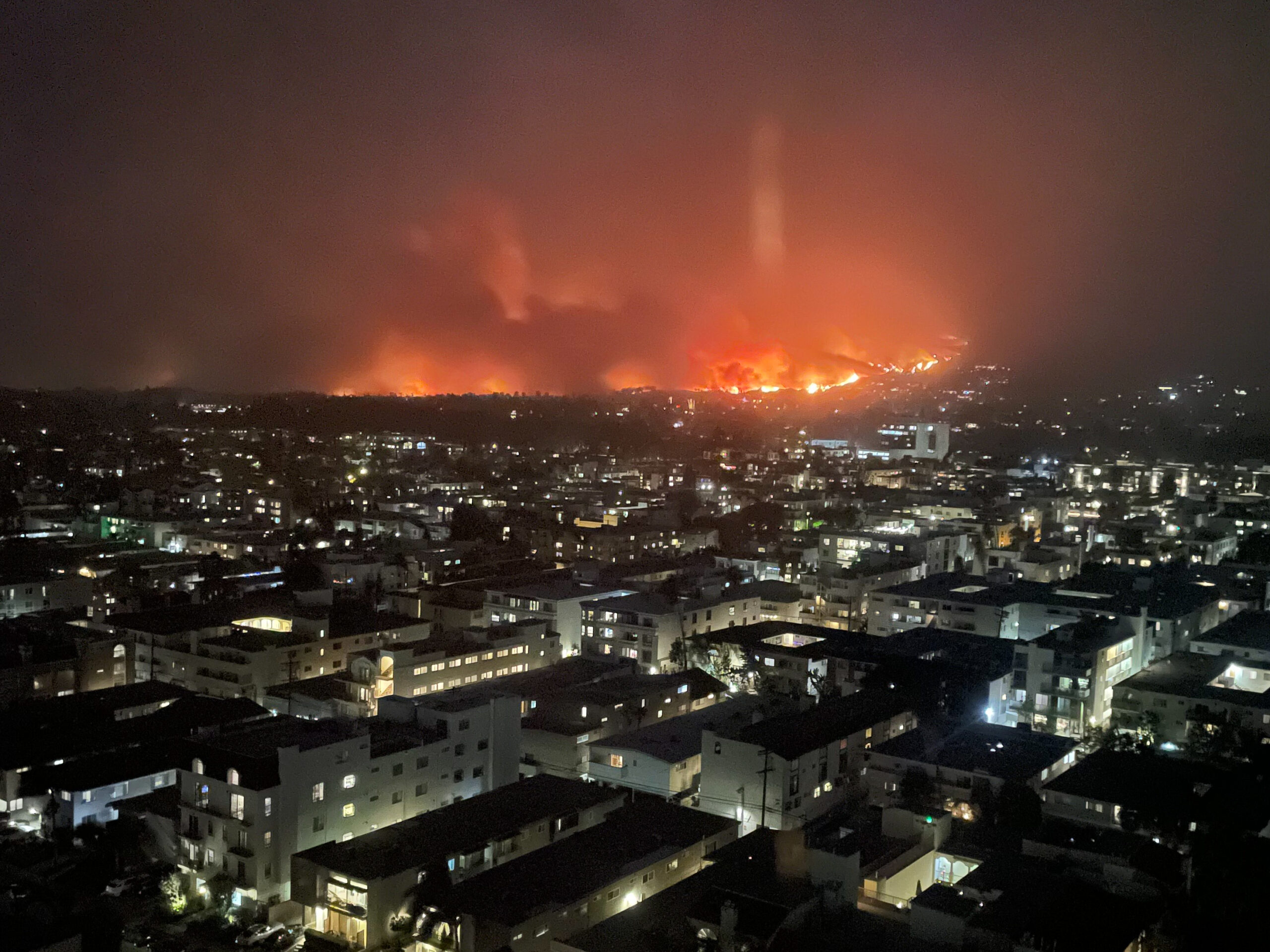
Courtesy of Marshall Howe
When the Los Angeles wildfires started, Sasha Schoettler ’26 was out of town with her family. Schoettler, who is from the Pacific Palisades neighborhood of Los Angeles, said she, her mother and sister anxiously followed the news and watched as the evacuation orders spread through their neighborhood.
Eventually, they received the devastating news: the fire had reached their home.
“We were sitting around the table, watching the TV, when all of a sudden there was some footage of houses burning, and I just saw our house,” Schoettler said. “We all kind of started screaming, saying ‘that’s our house.’ ‘That’s our house.’ And it was just really awful — to watch on TV as it burned.”
The ongoing Los Angeles wildfires have brought devastation to the city. As of Sunday night, the fires had killed at least 24 people and destroyed at least 12,000 structures, including homes, businesses and schools.
Aid efforts to support those affected by the fires and the LA Fire Department have circulated widely on social media throughout the week. Many people affected by the fires, including Schoettler and her family, have set up GoFundMes to raise funds to rebuild their homes.
The News spoke with nine students from Los Angeles who recounted their experiences of the devastating effects of the wildfires.
“My elementary school burned down. My high school burnt down. Right now, the fire is very close to my middle school. Every single house basically, where I went to birthday parties, and had dinner and with friends, every single house is gone,” Schoettler said. “Everyone in the Palisades is having a really difficult time coping with the fact that the locations of all our memories and everything we’ve grown up with, it’s all gone.”
Schoettler said that her family hired a cat sitter to take care of their two cats while they were away, but with little time to evacuate, only one could be rescued.
Schoettler and her family drove back to LA the following day and were able to get into their neighborhood, which had been closed off, by hiking through a back route and sneaking past police. The fire had completely destroyed her house, but she said it felt like a miracle when they reached her grandmother’s street and found her block untouched.
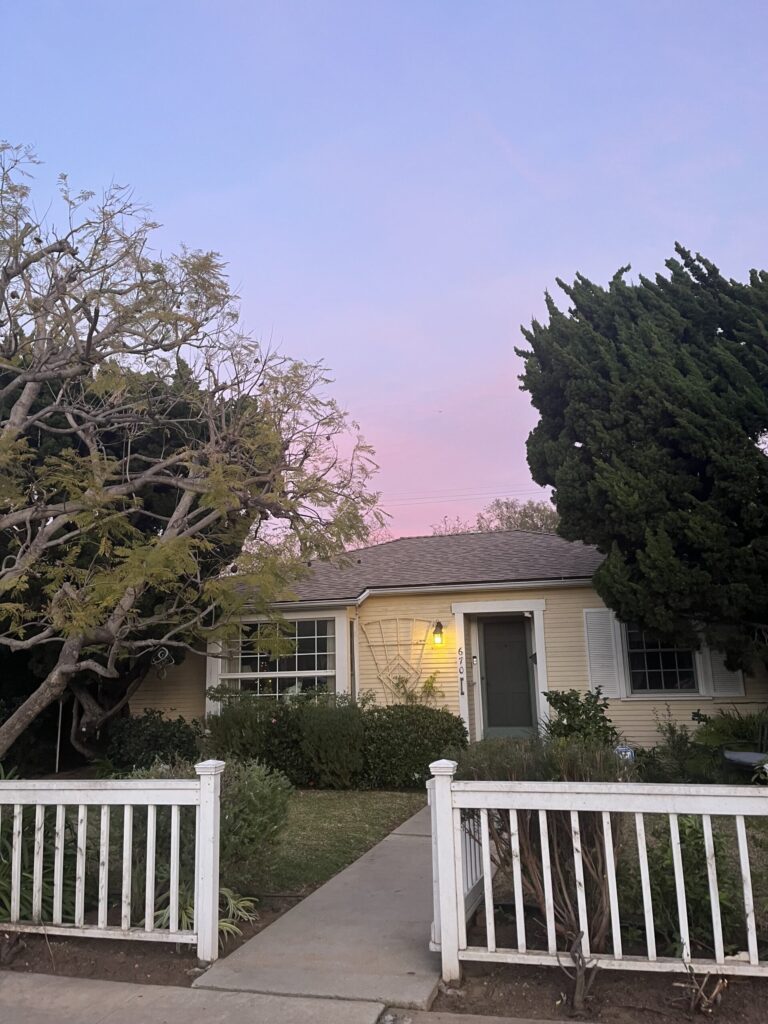
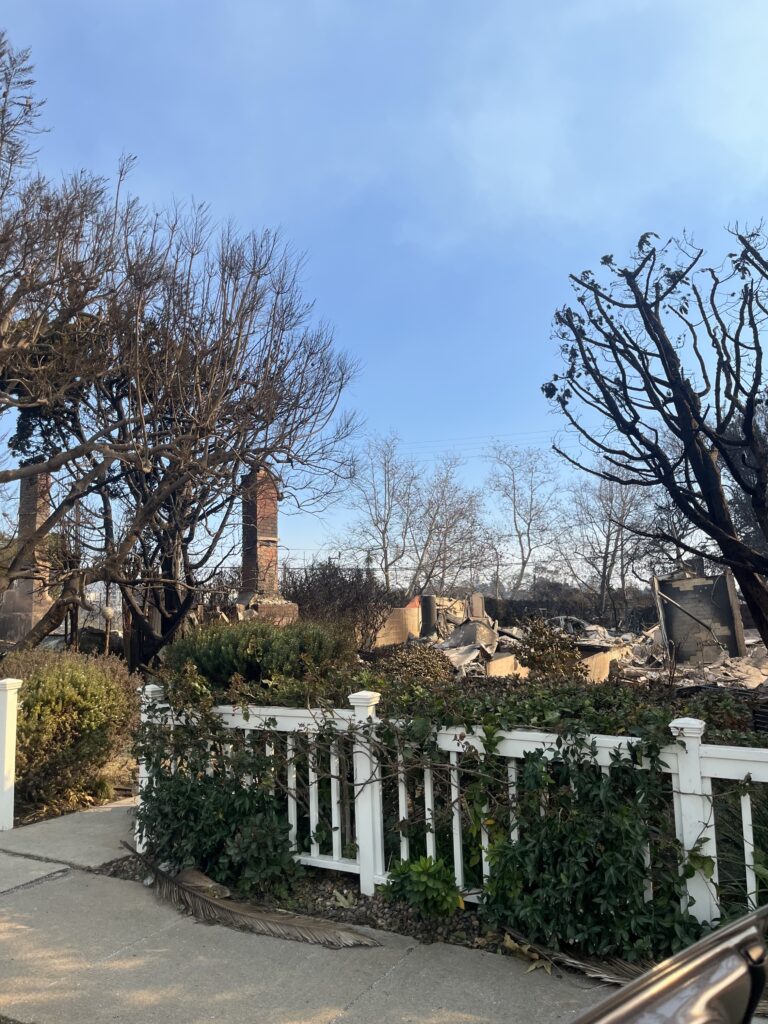
Huck Agar-Johnson ’27 also lost his home in the Palisades fire. Like Schoettler, Agar-Johnson was not in LA when the fires began. Watching reports, Agar-Johnson and his family quickly realized their home was in danger.
The next day, a neighbor was able to enter the area and confirmed that their house was completely gone.
“Everything was just left there. I think that was the hardest part. I keep thinking, ‘Oh, what if I had been there,’ then maybe I would have been able to save possessions that were really meaningful, a sentimental item,” Agar-Johnson said. “But who knows. Some of my other friends from high school, like they were at home and they barely had time to grab anything.”
Sarina Fereydooni ’26, who was at her home in the West Hills neighborhood of Los Angeles when the nearby Kenneth fire began, said that evacuating from the fires was a terrifying and overwhelming experience.
As of Friday night, the evacuation warning in Fereydooni’s neighborhood had been downgraded to “warning” from “mandatory evacuation.” At the time, Fereydooni said that once the evacuations had fully cleared and the Kenneth fire was contained, her family should be able to return home.
Maggie Grether ’26, a former staff reporter at the News who lives in Pasadena, said that she first realized the magnitude of the fire when she saw a “giant cloud of smoke” forming above the San Gabriel Mountains on Wednesday night.
Grether and her family were immediately concerned for Grether’s grandma, who lives in the North of Altadena, close to where the Eaton fire originated.
“My dad went and picked her up. As he was picking her up, there were police cars everywhere telling people to evacuate. When they returned, there was ash flying everywhere. We decided to leave then as well,” she said.
Grether’s neighborhood was officially ordered to evacuate shortly after Grether and her family left.
They were able to return a day later. The Eaton fire had at that time destroyed over 14,117 acres of the area, but Grether’s house and her grandmother’s had made it through — the fire perimeter stopped a few blocks away.
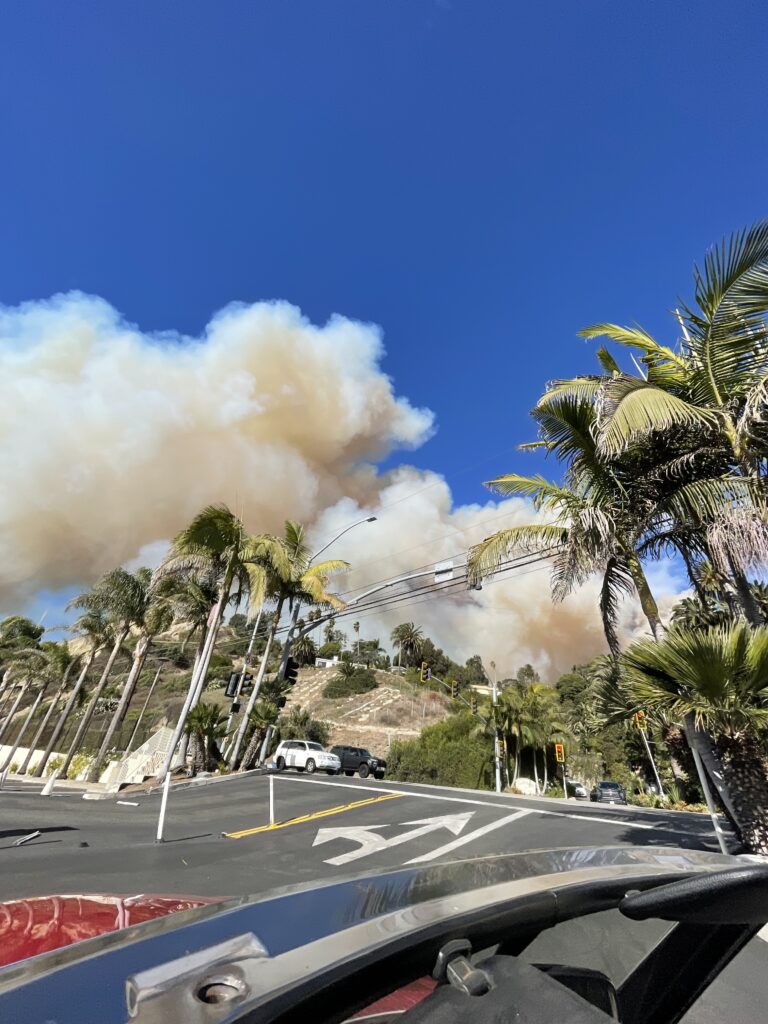
Marshall Howe ’26, who is from the Pacific Palisades, said that he saw the start of the Palisades fire on Tuesday morning but didn’t realize how destructive it would end up being.
“Tuesday morning, at about 10:30, I was actually at the beach, working out, and I looked up behind the hills and saw basically a plume of smoke,” he said. “But it was small and I didn’t think too much of it.”
Twenty minutes later, Howe’s mom texted him saying that he should leave as the fire was getting bigger and streets were closing down. Howe left the beach but continued his plans, heading to a dentist’s appointment in the Palisades village. While waiting for an appointment, he looked outside and saw the flames.
“But still, even then, I thought it would be under control. Growing up in Los Angeles, even though there are frequent fires, there was no precedent for this mass destruction,” he said.
When Howe left the dentist’s, residents had already started to evacuate. It was then that he realized the extent of the emergency.
Howe and his parents packed up as many things as they could, mainly irreplaceable, sentimental items, and drove towards safety. That night, he watched the fire spread through his community from an overhead view of the neighborhood at his father’s office. He said that the fire looked “unbelievable.”
“Honestly, it looked like entering the gates of hell, the way that the fire was burning along the hillside,” he said.
While many houses in Palisades were destroyed by the fire, some neighborhoods were less affected than others.
Howe said that though much of the area around his house had burned, his street was still standing on Wednesday morning.
“It’s a rollercoaster of emotions because you feel so incredibly fortunate, but at the same time everyone around you has lost everything,” he said. “And then on top of that, the town that you grew up in and love is just gone.”
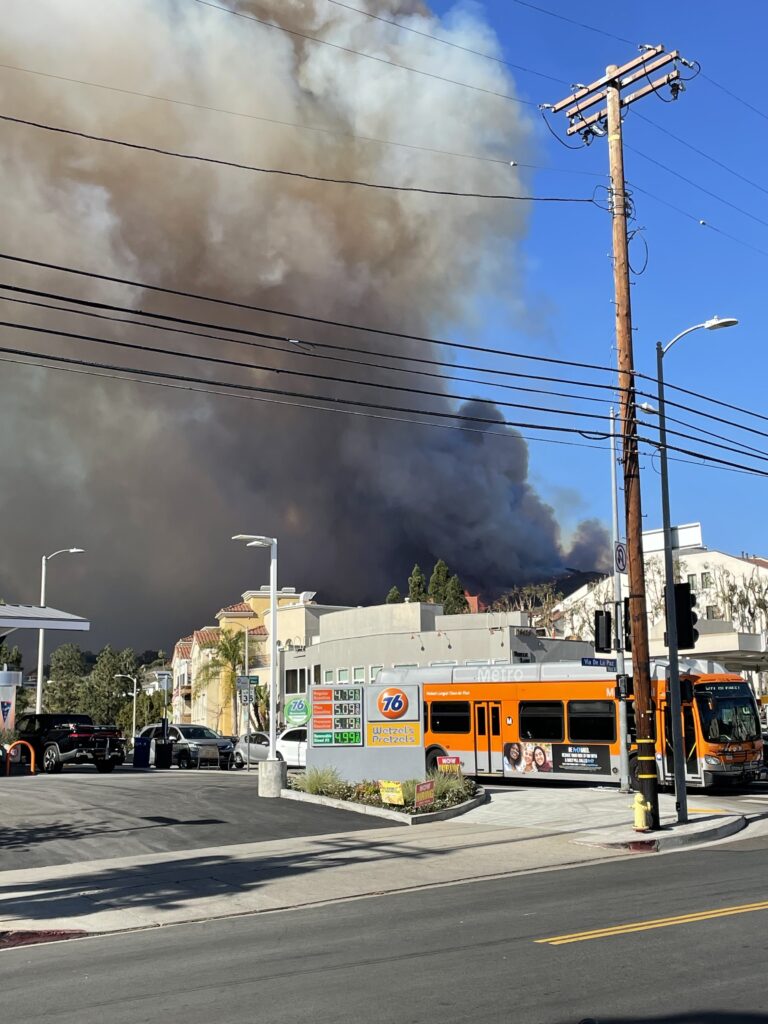
Several students interviewed by the News emphasized that they hope what people will take away from the tragedy is how climate change has exacerbated the destructiveness of natural disasters such as these wildfires.
In Southern California, fire seasons have gotten a lot longer and the areas at risk for wildfires have increased from rising temperatures and dryness. These conditions, combined with abnormally high winds earlier in the week, enabled the fire to spread so quickly and be so uncontrollable.
“This sort of fire destruction isn’t supposed to be normal in California. The vast majority of the most destructive wildfires in California’s history have happened in the past 25 years,” Grether said.
Fereydooni emphasized that one small act students can take — signing a climate action petition — would help remind “of how important it is to take action, to hold fossil fuels companies, who are responsible mostly for the planet warming conditions, accountable.”
Three students also brought up issues with how the tragedy has been portrayed in media coverage and social media discourse.
“There’s people who’ve lived there since the 50s, 60s or 70s, and bought their houses before it got expensive. There are elderly people. There’s a lot of veterans who live in my area,” Agar-Johnson said. “I sometimes see people saying ‘Oh, who cares if some celebrity lost one of their mansions,’ but in reality, it’s really gonna hit people a lot harder.”
Several students also emphasized how much they appreciated their friends reaching out to them and checking in on them. It is important to give people “the grace to deal with it” and understand that sometimes what they need is “just a shoulder to cry on or a person to hug,” Shoettler believes.
The Palisades fire first broke out on Jan. 7.







